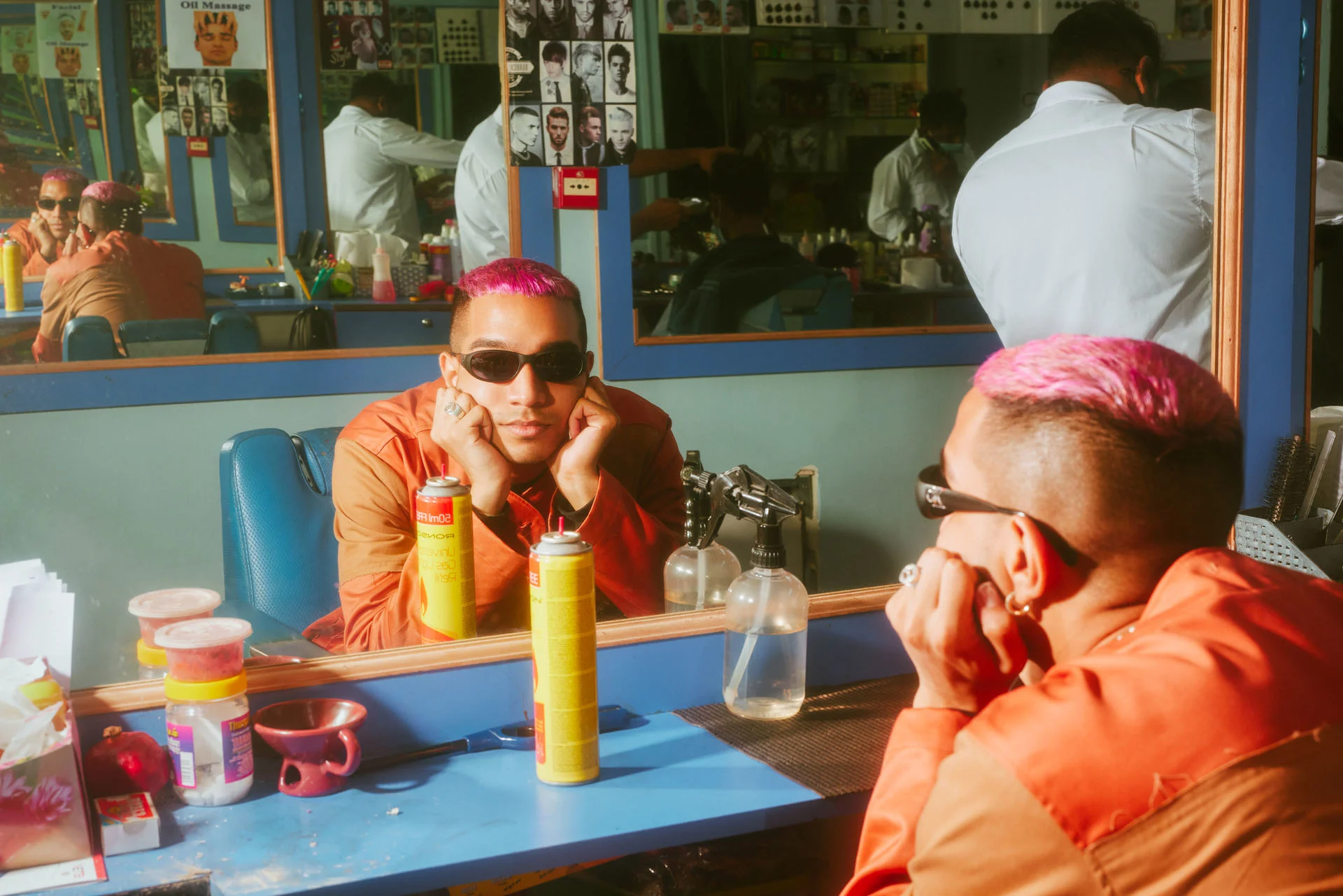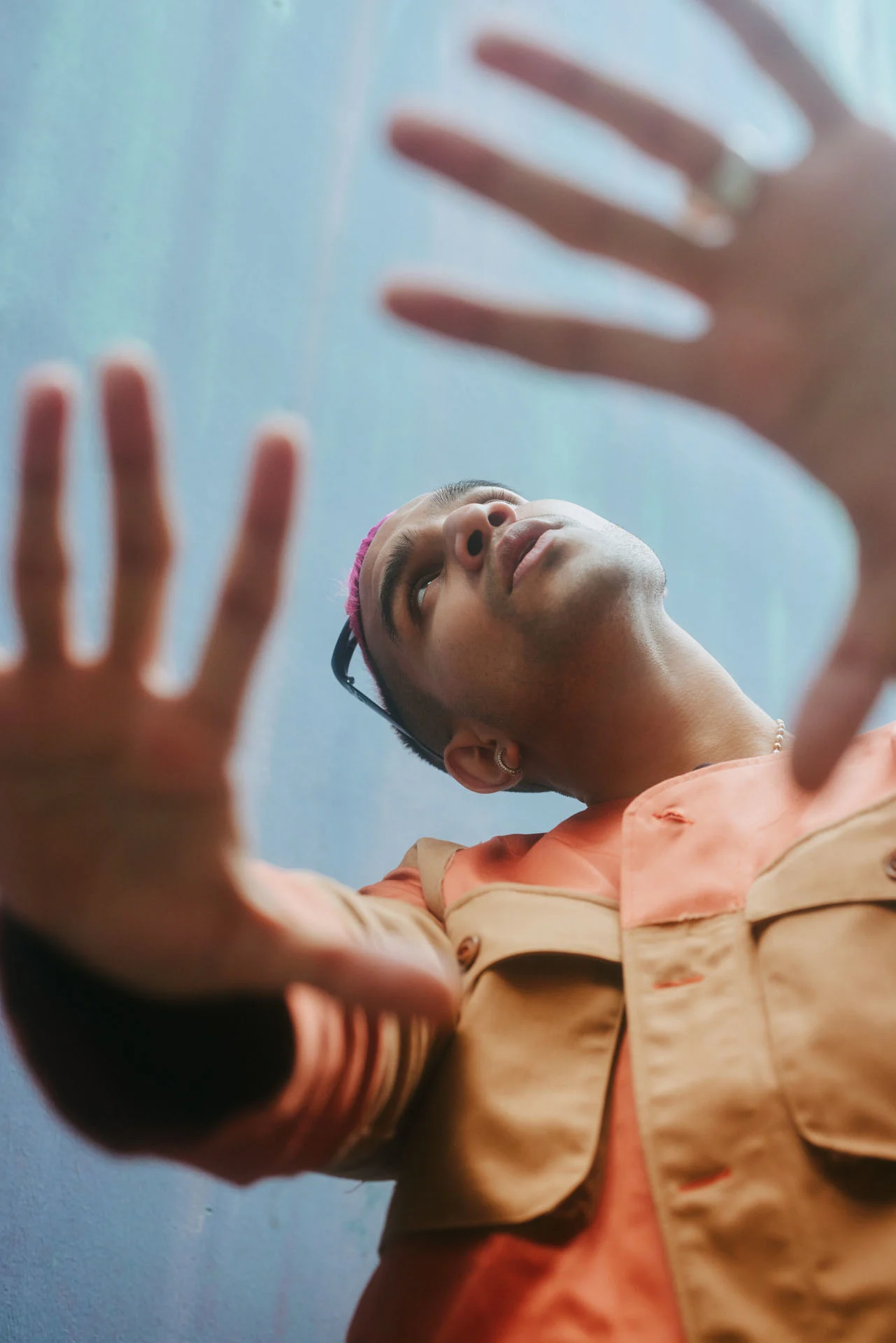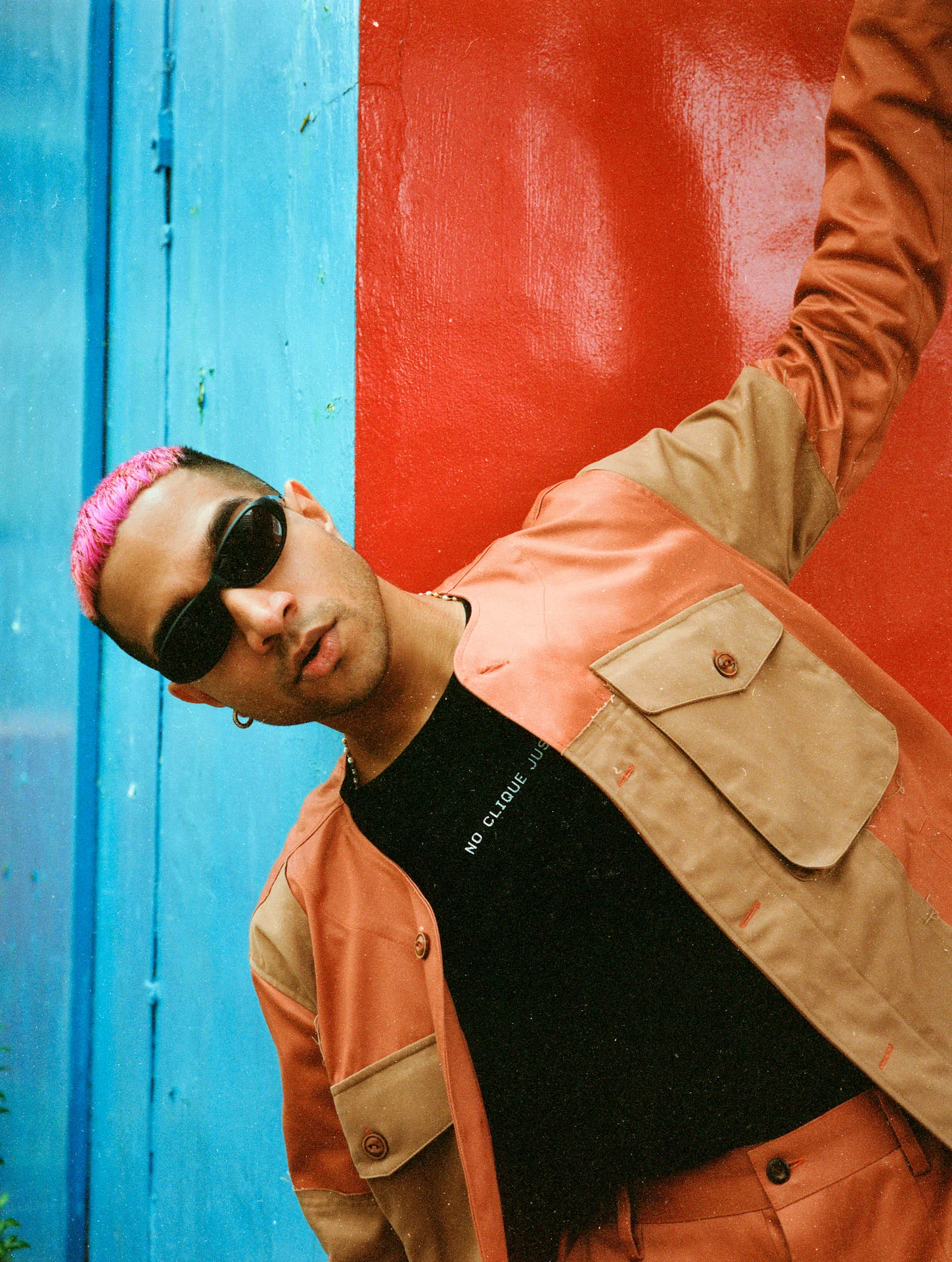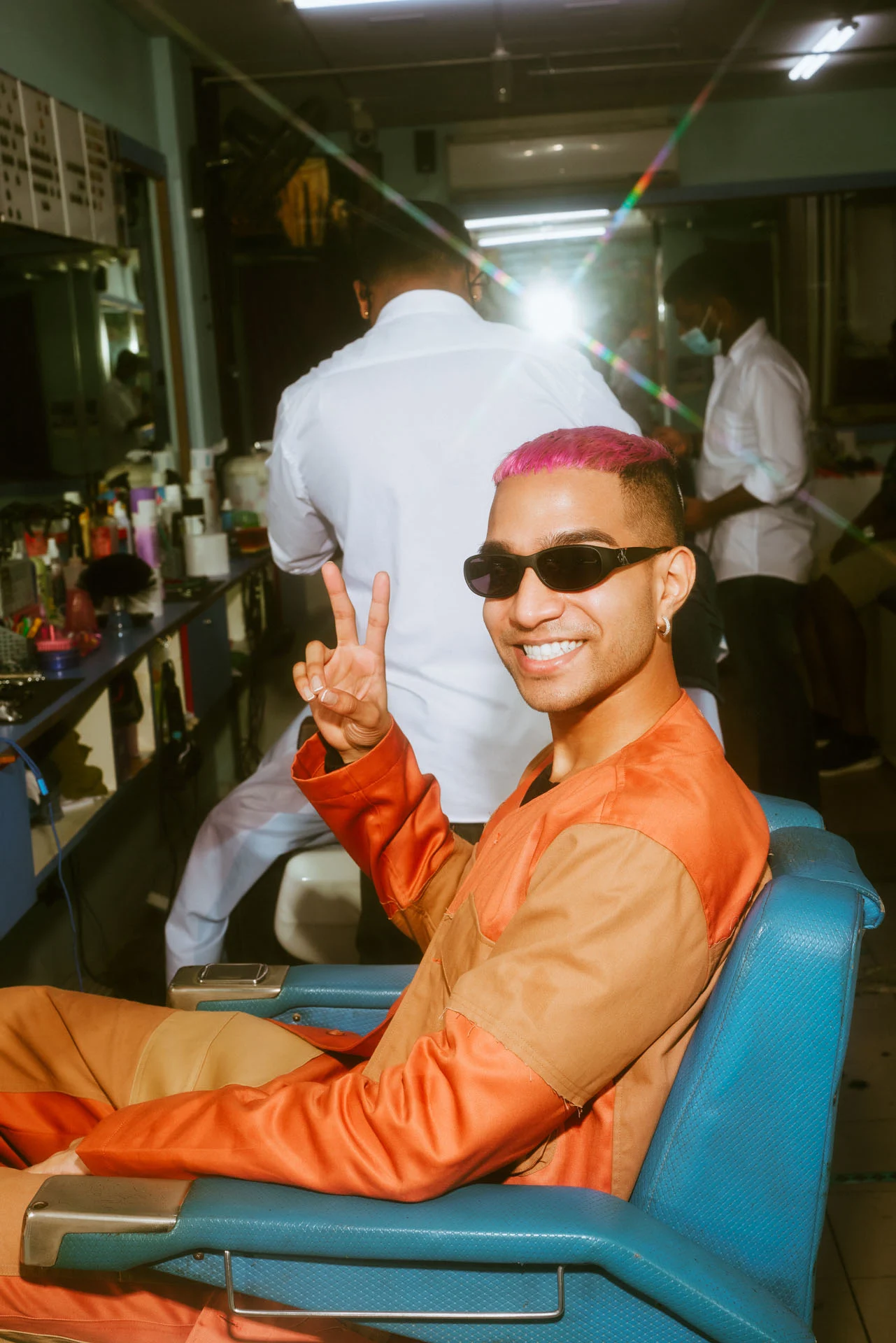

Yung Raja grew up in Singapore with roots in India’s southern state of Tamil Nadu. Now, the 25-year-old artist raps bilingually, hopping between Tamil and English as he references everyday elements of Indian culture through deft wordplay. Writer Nyshka Chandran meets the down-to-earth, Tamilian millennial to talk about the language of his creativity.
Photography by Lenne Chai.
As an Indian teenager in Japan, I never brought daal for school lunch, didn’t speak Hindi to the other brown person in school and disliked wearing traditional clothes outside of the community. Maitreyi Ramakrishnan’s character from the Netflix show Never Have I Ever, as well as multiple other kids of minority backgrounds, have similar stories. But not Yung Raja.
Growing up in Chinese-majority Singapore with roots in India’s southern state of Tamil Nadu, the 25-year-old rapper found it hard to believe when friends avoided chatting in Tamil publicly. “I saw my Indian friends shy away from our culture when I was in primary and secondary school,” he describes over Zoom. “I was never embarrassed, I just found it hard to communicate the differences and specialities of our culture to other Singaporeans.”
I’m not going to rap in fully English or fully in Tamil because neither of those are me.



Years later, the rising MC has created an art form based on exactly that. Alternating between Tamil and English, Rajid Ahamed references everyday elements of Indian culture through deft wordplay. Shout-outs to family, holidays (“Shawtys celebratin’ me like I’m Deepavali”), breakfast (“Dosa with the caviar”), Bollywood celebrities and Desi girls (“Mami wearing a sari not a skirt”) pepper his lyrics, while shots of Bharatanatyam dancers and Singapore’s Little India district, where he lives, fill his music videos.
"I’m not going to rap in fully English or fully in Tamil because neither of those are me," he explains. “I’m going to rap bilingual, which is me. My family didn’t change their ways one bit after moving to Singapore. They came here and remained themselves. I was born here two years after they moved, so I came into an unadulterated South Indian household. We never mixed English with Tamil to make it urban, we just spoke pure Tamil at home.” As a rapper, “I gotta portray my truth,” he continues. “If someone else is rapping about guns or gangs, that’s their reality, and in the same way, I gotta represent mine.”
Ahamed’s world, as his music shows, is full of family, pit stops at Komala Vilas (a well-loved Indian restaurant), ride-or-die homies and trips to Mustafa, a 24-hour shopping complex that carries everything from gold to vinyl records. Bilingualism is one of his defining features but it’s his ability to wittily narrate day-to-day experiences as a Tamilian guy that draws fans. His breakthrough track, a 2018 remix of the trap banger Gucci Gang, shows off this relatable quality. Lil Pump’s version is an ode to luxury lifestyles but Rajid swaps out Italian brands for South Asian foods such as poori, a type of fried bread. The track Poori Gang, a celebration of local eats, slaps as hard as the original but with the added twist of Indian culture.

Nothing can make me change my blueprint.
That record caught M.I.A’s attention, captured the hearts of the global Indian diaspora and launched a meteoric career rise. The lyricist soon found himself side-by-side with Joe Flizzow, a kingpin in Malaysian hip hop, founder of local record label Kartel and Southeast Asia managing director at Def Jam, which now counts Yung Raja in its artist roster. Then late last year, he signed with Alamo Records, a joint venture of Interscope Records/Geffen/A&M, placing him on the international stage. Wary of being pigeonholed as an “Asian” rapper, he insists he'll never change his fundamental vision. “Nothing can make me change my blueprint,” he says. “If management tells me to stop rapping in Tamil, that’s a no. That would be changing my artistry. But as I mature as an artist, I’ll have different experiences in my life, so my stories will evolve, but the blueprint will stay the same.”
Ahamed is rapping about what he knows, but as an unintended consequence, he’s also schooling fans on the nuances of Indian traditions. The majority of his bars are in the Tamil language, but he still possesses fans from diverse backgrounds – testament to his captivating flow and hip hop's increasing globalization. “I have people DM’ing me on a regular basis, asking me what a jalebi is, or what other terms mean,” he says with a laugh, referring to a popular sweet. “A lot of it comes from people outside the Indian community, they seem more interested in learning about our culture, which is one of the best outcomes to have happened. I take great pride in that. If you’re interested in where I’m from, I did my job.”
A lot of young artists think it’s a game of talent, but it’s also about teamwork and an open mindset.


As proud as he is being Tamilian – a community that makes up around five percent of Singapore’s population – he isn’t delivering any sermons. His bars are about girls, record deals and cash but delivered through the lens of a down-to-earth Tamilian millennial. His content may not be political, but there’s a deeper significance to his use of Tamil. “There’s never been a Tamil celebrity in Singapore who appeals to various markets,” he points out. “There are so many Tamil artists who are celebrities in their own community, but they don’t appeal to the entire country. We just don’t have that kind of representation, being a minority yet doing something that speaks to everyone.”

Even if fans don’t understand every word he says, the young artist is still able to connect with listeners from all walks of life through the power of his personality. For one, he’s humble, which makes him instantly likeable. Mad Blessings shows his modesty and happy-go-lucky nature as he celebrates his new-found stardom. It wasn’t too long ago that he was struggling to make it as an actor, so you get the sense that he’s enjoying every minute of his fame. Ahamed is also a joker at heart. He’s yet to drop an album, but his charm shines through scores of singles, freestyles and sheer stage presence. His music video for The Dance Song is literally comical. Everything from his bendy moves to blood-spattered scenes of him carrying a hammer in a medical suit screams entertainer. “As a kid, I was the class clown, the extroverted goof trying to make girls laugh,” he says.
I know the big picture now, it’s never just about me, it’s about advancing the music and community.

Despite his fun-loving attitude, the Singaporean doesn’t make any jokes when discussing his career. He’s already looking out for new talent, a sign that he takes his job seriously. Many others in his position wouldn’t want to share the spotlight just yet, but Ahamed understands that hip hop is centered around fresh faces. “In the rap game, it’s a very normal thing to be looking out for that next person,” he explains. “My first step into the industry was with many OGs around me. I wasn’t alone and fending for myself. It was teamwork from day one. What they taught me is not at all aligned with a selfish, competitive attitude, so I’m not about keeping the throne for myself. I know the big picture now, it’s never just about me, it’s about advancing the music and community.”
But hunting for the next big thing is proving more difficult than expected. “A lot of young artists think it’s a game of talent, but it’s also about teamwork and an open mindset,” he says. “It’s easy to fall in love with the brand deals and glitz, but just because you can rap, that’s not how it works. Once we come across someone who is level-headed enough to want to learn, I will take them on a personal tour. I’m looking forward to helping and uplifting that next person."

